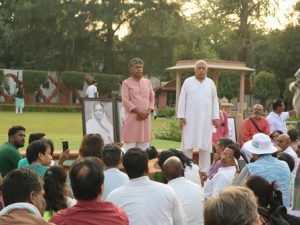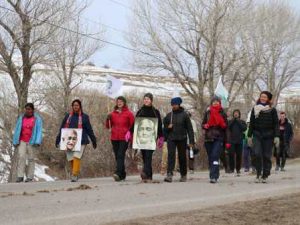Jai Jagat: Building Youth Movement with Nonviolence at Heart
The Jai Jagat 2020 is a global peace march led by Rajagopal P. V. from Delhi to Geneva with a wake-up call to respond to the socio-economic and environmental crisis and to make the world a better place for future generations.

In the midst of a dire situation that we find ourselves in at the moment, there are those who continue to be a source of inspiration. A group of volunteers from across the globe are marching on foot for a whole year, crossing countries and continents with the hope of spreading the message of peace and justice.Together, they joined the Jai Jagat 2020, a global peace campaign that was launched in October 2019 by the civil society organization Ekta Parishad in India. The founder of the Ekta Parishad, Rajagopal P. V., a well-known Gandhian activist, is leading the global peace march from Delhi to Geneva. Jai Jagat is a wake-up call responding to the deepening economic, social and environmental crises, and an urgent appeal to build solidarity among people.
“We call it Jai Jagat because if you succeed in dealing with poverty or the climate crisis, it’s a victory for the world. That’s what Jai Jagat means; the name itself translates to ‘victory for the world’,” says Rajagopal in an interview.
Also Read : Secure Land Rights Critical For Asias Rural Communities Threatened By Covid 19
Empowering Youth to Take Back the Narrative
When Rajagopal was young, he knew he had wanted to be an activist the day he saw how young people in India were struggling to find jobs and instead turned to rebellion and violence back in the 1970s. This was due to India’s fragile economy back then, forcing young people to resort to manual labour-like construction work. Rajagopal found his calling to form a youth community aimed at shifting the views of violence into peace and positive activism.
“Many roads were created in the ‘70s where young people found a new avenue to use their energy. This work, however, led to a surge in bandits. A lot of weaponry was involved, but then we managed to have these so-called bandits surrender their guns and advocate for nonviolence”, Rajagopal said.
From then on, Rajagopal committed to empowering youth in India, starting with those in the state of Madhya Pradesh to the whole nation. Tackling the use of ‘direct violence’, as he put it, was the initial goal of Ekta Parishad’s movement, but as social injustices remained apparent in the fringes of society, the movement soon became adamant in tackling the so-called ‘indirect violence’.
At the centre of all, it is the country’s young people. Youth is seen as drivers for change as they have the energy and enthusiasm to build a successful movement.

Rajagopal started by training young people from one village to another, linking one community organization to another in the hope of building an expansive youth network that is keen on ‘solving’ problems at the villagelevel. These problems ranged from lack of access to clean water and sanitation to land grabbing cases caused by the extractives sector.
Ekta Parishad’s main goal is to see India’s poorest people gain control over livelihood resources, especially land, water and forest. Building peoples’ movement and amplifying the voices of those who are marginalized are some of the tools that Ekta Parishad believes will bring positive change.
“Every time you act, you are influencing the decisions at the top. Either you’re forcing the government to make their administrative mechanism stronger so that the things at the bottom work properly or you’re asking them to pass a new law so that the impact on the ground can be seen”, said Rajagopal.
Orchestrating Change from the Bottom-up
Rajagopal believes that activism should translate into changing realities for those who are impacted the most, or as what he believes the poorest of India. Rising inequality in the country driven by a profit-oriented economic system makes those who live on and from the land become even more cornered.Nonviolence and peaceful activism are the means by which Ekta Parishad pushes for change. From taking to the streets and voicing out the concerns of the most marginalized to conducting evidence-based advocacy at the policy level, Ekta Parishad strives for tackling inequality at the national level.
As a member organization of the International Land Coalition Asia (ILC Asia), Ekta Parishad is known for its involvement in the National Engagement Strategy (NES) India, an initiative set in motion to drive change at the countrylevel. Together with other civil society organizations of ILC members, Ekta Parishad has advocated for the change for those facing landlessness, illegal tenancy and land alienation of all kinds.
In 2012, Ekta Parishad mobilized about 100,000 people to march to New Delhi in protest against a draconian land law. The law was passed in 1894 during the British rule, which stated that all land belonged to the State and that the State could take it back anytime. The huge protest successfully pushed for a new Act to be passed in 2013, which was called the ‘The Right to Fair Compensation and Transparency in Land Acquisition, Rehabilitation and Resettlement Act, 2013’ (also The Land Acquisition Act, 2013).
“We were able to shift many laws, like the Forest Rights Act in 2006. You have small groups of fighting in the villages, you create small changes. When you use the same instrument to struggle against national policies and programmes, the bigger change will happen”, Rajagopal said.
Grounding the Global Challenges
As Ekta Parishad’s youth movement grew in India, the idea to conceptualize the Jai Jagat campaign began to resonate with the organization. It is the aspiration of shifting the national-level advocacy to a global one that pushed Rajagopal and his team to take the bottom-up movement architecture to instigate change for global citizens.
“Can we create a global pressure from the bottom up by walking for one year? It’s almost like a replication of what we’re doing at the national level but now at the global level. It is how we network with the good people so that we can change a situation through dialogue because it is in the interest of the greater good and our planet,” said Rajagopal.
Also Read : Of Public Purpose Land Conflicts And Human Casualties
The year-long march started from New Delhi, India, and will end in Geneva, Switzerland. Marchers will cross 10 countries: India, Irán, Armenia, Georgia, Bulgaria, Serbia, Bosnia & Herzegovina, Croatia and Italy to arrive in Switzerland on 25 September 2020.
On the move, there will be training sessions, conferences and events where people will share their experiences and knowledge on nonviolence. By the time this story was written, the marchers should have reached Armenia. However, due to the latest developments of the COVID-19 pandemic, the situation has made it difficult for marchers to stay afoot and cross borders. Most of the marchers have now returned to their respective countries, with the exception of Rajagopal and his wife Jill Carr-Harris, who are in Armenia.
Jai Jagat’s initial plan was to reach Geneva by October 2020, where they would voice out their concerns to important UN agencies there. According to their latest newsletter, their plan is to hold symbolic European marches in the month of September 2020, with a planned Geneva Forum ending on 2nd October. The aim of the Geneva Forum will be to reshape the Jai Jagat movement in future as a global response in the post-Corona era.
Even though the Jai Jagat march is temporarily suspended until further notice, the entire campaign remains active in disseminating information and providing webinars about nonviolence through its website.
As it strives for peace and nonviolence, the campaign aims at addressing social injustices, and it hopes that this movement will inspire people and decision-makers to adopt nonviolence and ensure inclusion in tackling poverty, discrimination, conflicts and the climate crisis in order to achieve the Sustainable Development Goals (SDGs).
“I am questioning the SDGs because it would only remain as a wish-list if people don’t have the space to change their lives. If forests, land and water are acquired by companies, how can people fight for poverty? Maybe by walking, we can shift the public’s opinion on this,” said Rajagopal as we concluded the interview.
